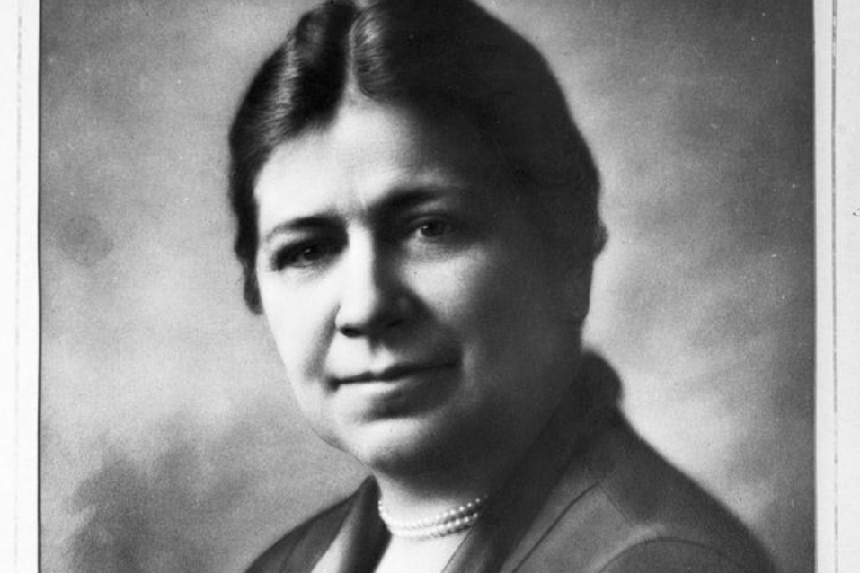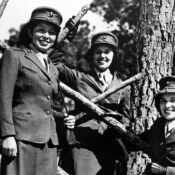“Men smile because women ‘make everything personal,’ but making a thing personal sometimes makes it intolerable!”
Last year, Seattle elected Jenny Durkan as mayor, only the second woman to hold the position after 91 years of men in the office. Before Durkan’s win, the first female mayor of Seattle — or of any large American city — was Bertha Knight Landes, an outsider politician known for audacious reforms. On the 150th anniversary of Landes’ birth, her legacy as a pioneering public servant in the years following women’s suffrage remains pertinent to a new generation of women hoping to take public office.
Bertha Knight studied history and political science at Indiana University, receiving her bachelor’s degree in 1891. She married Henry Landes, a geologist and Harvard grad, and they moved to Seattle when he took a job at the University of Washington. The couple lost two children tragically, but Landes became involved in several women’s clubs in the city. She was president of the Women’s Century Club and a member of the Sunset Club and Women’s University Club.
Landes organized large events to promote Seattle businesses, and her aptitude for civic engagement and public speaking brought her to the attention of prominent Seattleites, including the mayor. He placed Landes — as the sole woman — on a five-person commission to combat unemployment, and she began to set her sights on the city council.
Landes ran for a council seat in 1922, claiming, “It is not only the right, but the privilege and duty, of women to take part in the administration of public affairs.” Fresh to the political scene, Landes was adamant about standing up to the corruption that plagued the city, and she won 80 percent of the vote (more than any previous Seattle councilman).
Landes’ philosophy, as far as gender and politics were concerned, was that women offered a unique capacity to govern ethically. She recognized the gender roles entrenched in society and family life and held that inequality forged female candidates that were often more robust and hard-working than their male counterparts. In 1929, Landes wrote in Collier’s with uncanny foresight of a movement still decades away: “Only, at present, most women, in order to be elected to office, have to be better than their men opponents — just as, among the higher ranks of business and professional workers, women receive not ‘equal pay for equal work,’ but equal pay for better work.”
After a crusade against Seattle dance halls and their disregard of Prohibition and “public decency,” Landes was elected president of the city council. Securing this role allowed her to become interim mayor of Seattle while the current mayor, Edwin J. Brown, attended the Democratic National Convention in 1924. Landes rose to the occasion without hesitation, demanding that the chief of police take action against the rampant “bootlegging and gambling” carried out in the city without fear of consequence from an inadequate, or complicit, police force. He responded with resentment, and Landes fired him, declaring a state of emergency in Seattle and taking control of the police force herself.
Brown returned from the convention embarrassed by national headlines that delivered a one-two punch: Seattle was broadcast as a den of crime and corruption, and the turbulent city had been seized by a woman. Brown reinstated the Chief of Police, and gave assurance of Seattle’s stability. Two years later, Landes ran a campaign against him.
Landes made appeals to voters based on “municipal housekeeping.” This movement maintained that a woman’s role was to keep a tidy house, but it expanded the idea of the home to the public sphere. She wrote, “My mayoralty experience early convinced me of the need in public office for the woman with a sense of economy which she has exercised by keeping house and bringing up her family on a moderate budget. Such a woman must often be shocked and disgusted at the waste and extravagance in her community’s annual expenditure for its housekeeping.” While men in politics often held myriad ties to businesses and shady interests, Landes proclaimed that female leaders would lack the career ambitions that restricted true progress and reform.
In 1926, Landes defeated Brown in Seattle’s mayoral election without declaring a political party. During her two-year stint in office, she touted her results in balancing the city’s finances as well as shaking up its police force. She eliminated deficits in the park department, the railway system, and public utilities. She ousted police officers who allowed bootlegging and gambling, and she encouraged citizens to take responsibility for the enforcement of Prohibition and traffic laws. Landes reveled in her mayoral duties, opening baseball games, breaking ground for new buildings, and welcoming distinguished visitors like Charles Lindbergh and Queen Marie of Romania.
Unfortunately, when her term came to an end, in 1928, Prohibition had lost its popularity, and the mayor had cultivated a host of enemies on her path to restoring the city. Her opponent in the year’s election gained the support of many policemen and businessmen who had been vexed by Landes’s reforms, and he drastically outspent her in his campaign. She challenged her competitor to a series of debates, but he never showed, leaving Landes onstage speaking to an empty chair. “Any married man knows the danger of getting into an argument with a woman,” he said.
Landes was defeated and never returned to politics, focusing instead on her husband’s work at the university. She persisted in her criticism of corruption and toxic political machines, however, and she continued encouraging women to become involved in politics. “Judgment, poise, compromise, patience, resolution, tact, self-forgetfulness, tolerance, and common sense” were, as Landes wrote, traits that women gleaned from their unique life experiences. “There are no qualities which we need more in our public life. Why should they not be brought there by the mother who has acquired them?”
Become a Saturday Evening Post member and enjoy unlimited access. Subscribe now




Comments
Ms. Landes is one of the most remarkable American women I’ve ever read about in domestic politics. She was a woman that accomplished so much during a very turbulent time in Seattle. The right woman at the right time. She was very insightful, having an eye on the future when most people did not on the present.
Yes, she had to be tougher because she was a woman to get things accomplished that would be for the common good of all women AND men! Her accomplishments in paragraph 6 alone are something no one else would or could have done. Seattle was in a do or die situation of crisis in 1924, and she took over the police force herself because it was the right thing to do to save the city, and for the common good of the people. She had the guts to do what needed to be done, and did it. No phony, selfish “agenda”!!
She accomplished just as much in 1926 as Mayor, solidifying her previous work. In the last paragraph she proposes questions that are equally timely now. Seattle still owes her a great deal of gratitude, as does the rest of the nation. I have a great deal of respect for her. I get the feeling she was a caring, kind person, but never mistake that as a sign of weakness, because it definitely was not. Not at all.